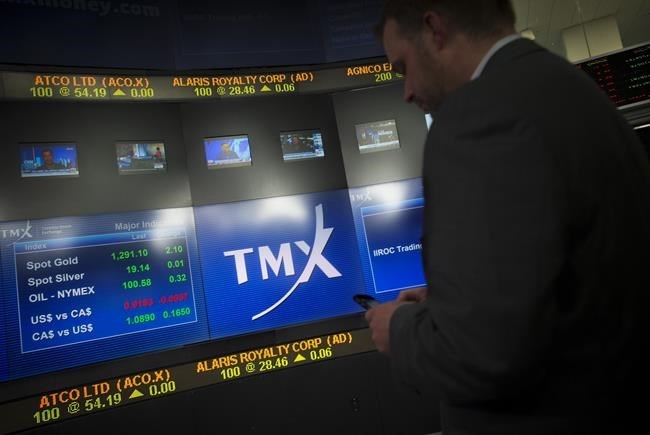TORONTO — North American stock markets closed lower for a third day this week as U.S. inflation numbers raised concerns about central banks increasing interest rates earlier than forecast.
The American government reported Wednesday that consumer prices rose 0.8 per cent in April, more than expected, and prices rose year-over-year at the fastest rate since 2008.
That sent stock markets lower with the S&P/TSX composite index closing down 166.27 points to 19,107.77.
In New York, the three stock markets each dropped by at least two per cent. The blue chip Dow Jones industrial average had its worst day in nearly a year, falling by 681.50 points at 33,587.66. The S&P 500 index decreased by 89.06 points at 4,063.04, while the tech-heavy Nasdaq composite lost 357.75 points or 2.7 per cent at 13,031.68.
The relative weight of the energy and technology sectors in Toronto helped to cushion some of the blow from inflation fears that were in full force on Wednesday, said Scott Guitard, senior vice-president and portfolio manager at Fiduciary Trust Canada.
"Bond yields are up globally as investors are assuming that central banks will have to raise their policy sooner than they previously indicated," he said in an interview.
Guitard said it's not surprising that inflation is higher but there are many variables in play as we get closer to the economic reopening.
The question is whether inflation is "transitory" as has been suggested by the Federal Reserve, or more prolonged and structural.
"That's really what's going to dictate the longer-term trends in equity markets. Right now the movements that we see today are more reactionary to the big CPI number that came out this morning in the U.S.," he said.
Guitard said the numerous unprecedented events over the past 12 months, including the speed of the lockdowns, make it difficult to say if higher inflation is just temporary.
While it's possible the Fed will change its tone over the next year, he believes the bank will wait to see how the economic reopening looks.
Energy was the lone sector to rise on the day. It gained 1.3 per cent as crude oil prices at one point rose to the highest level since October 2018 before futures settled at the highest level since early March.
The June crude contract was up 80 cents at US$66.08 per barrel and the June natural gas contract was up 1.4 cents at nearly US$2.97 per mmBTU.
Shares of Vermilion Energy Inc. climbed 4.2 per cent while Whitecap Resources Inc. and Cenovus Energy Inc. were up 3.2 and 2.8 per cent, respectively.
Crude prices increased despite U.S. crude stockpiles dropping less than expected last week while exports fell to a 2018 low.
"I think it's more of an expectation on the demand side with the global economy opening back up and it's putting pressure on commodities in general is the theme that we've seen in recent months," Guitard said.
The Canadian dollar traded for 82.67 cents US, unchanged from Tuesday.
Health care and materials led the 10 major sectors on the TSX that moved lower. Health care lost 2.6 per cent as Aphria Inc. and Aurora Cannabis Inc. each lost 5.6 per cent.
Materials fell 2.2 per cent as gold prices decreased as bond yields rose on inflation worries.
The June gold contract was down US$13.30 at US$1,822.80 an ounce and the July copper contract was down 2.6 cents at almost US$4.74 a pound.
Hudbay Minerals Inc. fell seven per cent while First Quantum Minerals Ltd. was down 6.7 per cent.
A 10 per cent share drop by BRP Inc. pushed consumer discretionary lower while industrials fell and technology continued its downward trend.
Tech lost 0.6 per cent as shares of BlackBerry Ltd. and Lightspeed POS Inc. were down 3.9 and 3.4 per cent, respectively. Shopify Inc. once again relinquished its spot as the most valuable Canadian company to the Royal Bank of Canada as the Ottawa company's shares decreased two per cent.
With Wednesday's decrease, the TSX is still up 9.6 per cent so far in 2021.
While inflation fears will continue, Guitard said equity markets should end higher for the year.
"We expect sectors like technology to continue to be volatile as the path of least resistance for interest rates will continue to be higher, but when we look at the more value-oriented sectors we still think there's value in them in that they should trend higher over the remainder of 2021."
This report by The Canadian Press was first published May 12, 2021.
Companies in this story: (TSX:SHOP, TSX:RY, TSX:FM, TSX:HBM, TSX:BB, TSX:LSPD, TSX:APHA, TSX:ACB, TSX:VET, TSX:WCP, TSX:CVE, TSX:DOO, TSX:GSPTSE, TSX:CADUSD=X)
Ross Marowits, The Canadian Press



